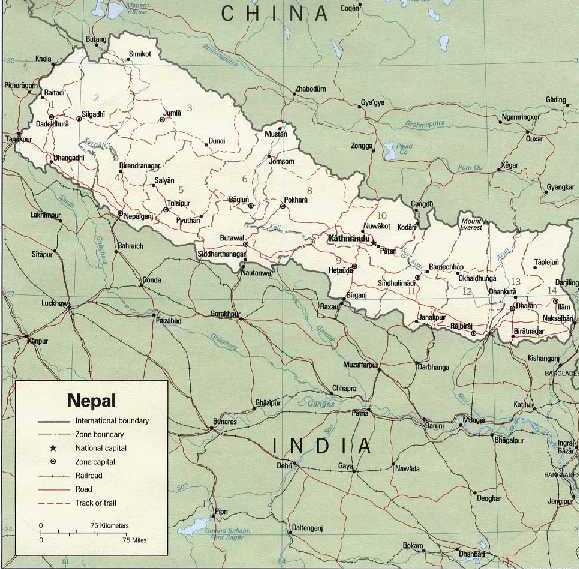Rationale/Introduction
The “Maoist Uprising”
is a one week unit that serves to introduce students to Nepalese culture
and the Maoist Uprising centered in western Nepal. Students will
be encouraged to think creatively and critically about the implications
of this social, political and economic movement on the culture and people
of the nation of Nepal. Students will consider the role of identity
and voice as they try to determine why a “People’s Movement” has taken
hold in this Himalaya country. Whose fight is this and should the
world be paying closer attention?
This unit has been designed
for an elective social studies course for students in grades 10-12.
The course explores the cultures of the Asia/Australia. The following
is the rationale provided for students on the syllabus:
World Cultures Asia/Australia
Interdependence
is the fundamental law of nature. Many of the smallest insects are
social beings who, without any religion, law or education, survive by mutual
cooperation based on the innate recognition of their interconnectedness.
-Dalai Lama
World Cultures Asia/Australia
will provide us with the opportunity to explore our world neighbors through
geography, literature, art, politics, philosophy and food. This course
will focus on the diverse cultures of Asia and Australia. We will
get to know these regions of the world by examining the components of culture,
exploring communities and conflicts and how we are similar and different
to the people that live in this part of the world. As Americans we tend
to have a Eurocentric (European) perspective on things, this course will
encourage us to look at the world differently, beyond our ethnocentric
tendencies. Our goal is to develop a greater understanding of our world
and in doing so, a better understanding of ourselves.
Learning without
thought is labor lost. Thought without learning is dangerous.
–Confucius
By exploring other
cultures students will gain a greater understanding of themselves, what
they believe in and how they relate to the world community. It is
with this intent that World Cultures and this component of its curriculum
have been designed.
LESSON OVERVIEW
1. Nepalese Cultural Fair
A research, web quest,
students will work in groups and explore one of the 9 components of culture
previously specified and design an information booth on that component.
2. Modern Political History
of Nepal
An introduction to Nepalese
history from the 19th century to present day with an emphasis on examining
why a “People’s Movement” has taken hold in western Nepal and its historical
context.
3. Deconstructing the Maoist
Uprising
Students will examine
and critique a variety of articles from diverse sources in an attempt to
determine who the players are and what their agendas are in the political
upheaval that has gripped Nepal.
4. Whose Fight is This?
In small groups students
will become a person involved in the Maoist conflict. They will work
cooperatively to draft a position paper which will be presented at a summit
that will be conducted to illuminate each side’s position and begin to
talk about policy changes that might lead to peace.

http://www.preventconflict.org/portal/nepal/nepal_portalhome.php
|